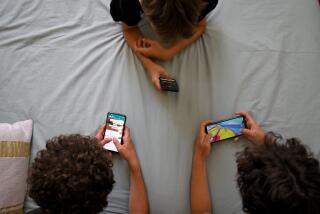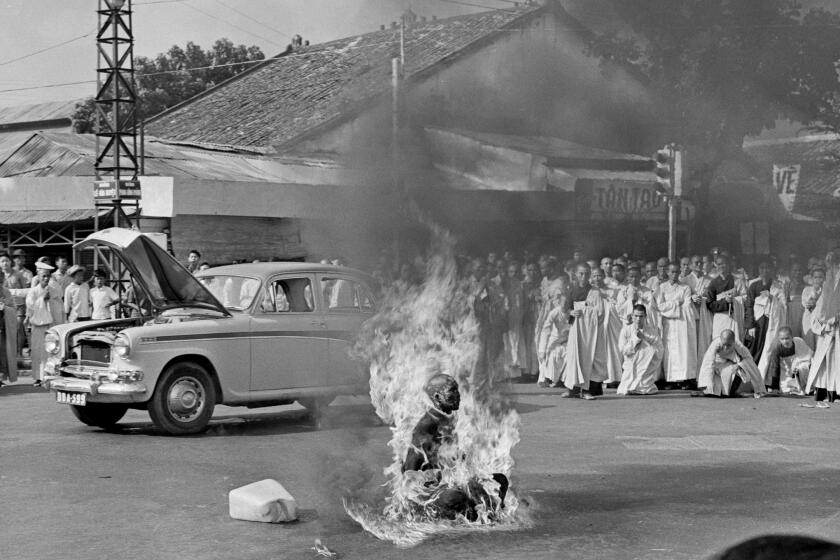Op-Ed: For this boy, 3/14/15 is his slice of pi
Pi Day is Saturday, 3/14/15. Pi lovers know that its first five digits are 3.1415, and that this date will not roll around again for 100 years.
When my son was in seventh grade, his algebra teacher promised to buy a pie that March for the student who memorized the most digits of pi. My son immediately taped the first six pages of numerals, single-spaced, to his bedroom door. When we knocked, he demanded we read a few lines to gain entrance.
For days after school, he stayed in his room studying the sequence, talking into his voice recorder and playing it back. “How do you do it?” I asked when I tested him the first time and he recited 20 numbers. “I clump some of the numbers together in groups,” he said. “Chunking,” I said, recalling the memorizing technique from my psychology training. “Great strategy!” But it was odd to hear him recite a string of random numbers, rattling off 30, then 40 digits.
I was proud that my kid had this facility, one I definitely didn’t share, but I questioned how this skill of rote memorization could ever be of use in life. “Who else is competing in this contest?” I asked, picturing him the only one, awkward and geeky standing in front of his class reciting numbers in a monotone like a robot. I feared it would ostracize him, make him appear freakish.
“Half the class is doing it,” he said.
“Oh, cool,” I said, trying to hide my relief.
After one of our quizzing sessions, I asked why he did it. He replied, “For the pie, of course.” But I wondered if it really was because he was comfortable in the realm of numbers, and he had found his place in the math class. “I think Pi Day should be a national holiday,” he said.
Only the year before, we had learned that our son’s inflexibility, black-and-white thinking, and meltdowns from sensory overload were classic signs of Asperger’s syndrome. It was something that as a school psychologist I was embarrassed I had not figured out. But it was 2004 and way before the huge wave of autism spectrum disorder diagnoses. We had spent several miserable years not understanding why he broke down in tears or raged when his clothing irritated his skin, when we changed plans on him, when he had to stop playing with Legos and come to dinner without enough warning.
By March 14, 2004, he knew 50 digits. But he was afraid he’d get off track somewhere along the line, that nerves would make him forget one sequence. My partner had made him pancakes and bacon instead of setting out cereal that morning, and I had fussed with his cowlick like a nervous stage mother. He tolerated our goodbye hugs and then sprinted off to our family’s cheers. “Go Pi Day! Win us a pie!”
After school, I picked him up for an orthodontist appointment. He got into the car quietly, not thrilled to be getting a second set of braces. When I patted his knee, he brushed off my touch as he always did.
“Well?” I asked.
He glanced at me. “What?”
“Well?” I waited a beat. “Did you win us a pie?”
“No.” He smiled, clearly not upset. “No pie for dessert.”
“Darn,” I said. “Did you forget? Or say the wrong number? Did she let you take it back? Who won?” I have a bad habit of asking questions on top of questions when I’m excited.
“Sam won.”
Sam knew 80-some digits, which he could rattle off like a machine. I was beginning to understand what those boys enjoyed about each other, why they were compatible. Their brains worked alike. The English teacher had lent copies of “The Curious Incident of the Dog in the Night” to him and his buddies because she knew they’d enjoy the detective story and appreciate the young boys’ love of prime numbers.
“How did you do?”
“I came in second.”
“Wow!” I shouted. “You did great. Second place. How many kids competed?”
“About 12 or 13.”
“Fantastic!” I said, pride turning me practically manic. “I’m buying you a pie.”
In January, my son, now 21, called to let me know about a job he’d applied for. When he finished, I asked, “Hey, do you know that this year, Pi Day will be 3/14/15?” He paused, and for a second I was happy that I was the one presenting him this news. But then he set me straight. “I’ve been waiting for this day for years.”
Katherine A. Briccetti, a school psychologist, is author of “Blood Strangers,” a memoir about adoption.
Follow the Opinion section on Twitter @latimesopinion and Facebook
More to Read
A cure for the common opinion
Get thought-provoking perspectives with our weekly newsletter.
You may occasionally receive promotional content from the Los Angeles Times.






